The best way is to use "Android Studio" -> gradle.build -> [productFlavors + generate manifest file from template]. This combination allows to build free/paid versions and bunch of editions for different app markets from one source.
This is a part of templated manifest file:
<manifest android:versionCode="1" android:versionName="1" package="com.example.product" xmlns:android="http://schemas.android.com/apk/res/android">
<application android:allowBackup="true" android:icon="@drawable/ic_launcher"
android:label="@string/{f:FREE}app_name_free{/f}{f:PAID}app_name_paid{/f}"
android:name=".ApplicationMain" android:theme="@style/AppTheme">
<activity android:label="@string/{f:FREE}app_name_free{/f}{f:PAID}app_name_paid{/f}" android:name=".ActivityMain">
<intent-filter>
<action android:name="android.intent.action.MAIN"/>
<category android:name="android.intent.category.LAUNCHER"/>
</intent-filter>
</activity>
</application>
This is template "ProductInfo.template" for java file: ProductInfo.java
package com.packagename.generated;
import com.packagename.R;
public class ProductInfo {
public static final boolean mIsPaidVersion = {f:PAID}true{/f}{f:FREE}false{/f};
public static final int mAppNameId = R.string.app_name_{f:PAID}paid{/f}{f:FREE}free{/f};
public static final boolean mIsDebug = {$DEBUG};
}
This manifest is processed by gradle.build script with productFlavors and processManifest task hook:
import java.util.regex.Matcher;
import java.util.regex.Pattern;
import org.gradle.api.DefaultTask
import org.gradle.api.tasks.TaskAction
...
android {
...
productFlavors {
free {
packageName 'com.example.product.free'
}
paid {
packageName 'com.example.product.paid'
}
}
...
}
afterEvaluate { project ->
android.applicationVariants.each { variant ->
def flavor = variant.productFlavors[0].name
tasks['prepare' + variant.name + 'Dependencies'].doLast {
println "Generate java files..."
//Copy templated and processed by build system manifest file to filtered_manifests forder
def productInfoPath = "${projectDir}/some_sourcs_path/generated/"
copy {
from(productInfoPath)
into(productInfoPath)
include('ProductInfo.template')
rename('ProductInfo.template', 'ProductInfo.java')
}
tasks.create(name: variant.name + 'ProcessProductInfoJavaFile', type: processTemplateFile) {
templateFilePath = productInfoPath + "ProductInfo.java"
flavorName = flavor
buildTypeName = variant.buildType.name
}
tasks[variant.name + 'ProcessProductInfoJavaFile'].execute()
}
variant.processManifest.doLast {
println "Customization manifest file..."
// Copy templated and processed by build system manifest file to filtered_manifests forder
copy {
from("${buildDir}/manifests") {
include "${variant.dirName}/AndroidManifest.xml"
}
into("${buildDir}/filtered_manifests")
}
tasks.create(name: variant.name + 'ProcessManifestFile', type: processTemplateFile) {
templateFilePath = "${buildDir}/filtered_manifests/${variant.dirName}/AndroidManifest.xml"
flavorName = flavor
buildTypeName = variant.buildType.name
}
tasks[variant.name + 'ProcessManifestFile'].execute()
}
variant.processResources.manifestFile = file("${buildDir}/filtered_manifests/${variant.dirName}/AndroidManifest.xml")
}
}
This is separated task to process file
class processTemplateFile extends DefaultTask {
def String templateFilePath = ""
def String flavorName = ""
def String buildTypeName = ""
@TaskAction
void run() {
println templateFilePath
// Load file to memory
def fileObj = project.file(templateFilePath)
def content = fileObj.getText()
// Flavor. Find "{f:<flavor_name>}...{/f}" pattern and leave only "<flavor_name>==flavor"
def patternAttribute = Pattern.compile("\\{f:((?!${flavorName.toUpperCase()})).*?\\{/f\\}",Pattern.DOTALL);
content = patternAttribute.matcher(content).replaceAll("");
def pattern = Pattern.compile("\\{f:.*?\\}");
content = pattern.matcher(content).replaceAll("");
pattern = Pattern.compile("\\{/f\\}");
content = pattern.matcher(content).replaceAll("");
// Build. Find "{$DEBUG}" pattern and replace with "true"/"false"
pattern = Pattern.compile("\\{\\\$DEBUG\\}", Pattern.DOTALL);
if (buildTypeName == "debug"){
content = pattern.matcher(content).replaceAll("true");
}
else{
content = pattern.matcher(content).replaceAll("false");
}
// Save processed manifest file
fileObj.write(content)
}
}
Updated: processTemplateFile created for code reusing purposes.
